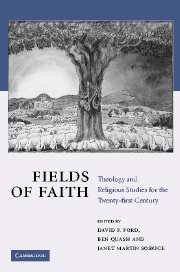9 - Argument
Published online by Cambridge University Press: 22 September 2009
Summary
INTRODUCTION
This essay contributes to what Nicholas Lash calls ‘meetings on mutual ground’ by looking at one of the practices that is shared across the various disciplines in Theology and Religious Studies: arguing. Arguing takes its place alongside other basic practices like describing or entering into dialogue, and probably should not be considered independently of them. These practices might be said to fall loosely under the category of ‘paying attention’ (along with textual study, historiography and aesthetic criticism). In what follows I restrict my remarks to arguing, and take for granted the kinds of descriptive and dialogical issues explored and developed by writers like Timothy Jenkins and Peter Ochs.
The primary question that motivates this essay is: ‘What do theologians hope to achieve by arguing with each other and with non-theologians?’ I shall investigate this topic as a Christian theologian. More particularly, the influence of the work of Nicholas Lash and his understanding of the inter-relationships between tragedy, prayer and theological argument will be evident in what follows. I hope that the kinds of issue discussed here will, however, readily suggest possible ways of tackling the subject from within other religious traditions and, perhaps, from perspectives that are not immediately congruent with the major faith traditions of the contemporary world. Is argument any good? This question has Platonic and Aristotelian dimensions. If Platonic, then the task will be to find out whether, and in what ways, argument is associated with The Good.
- Type
- Chapter
- Information
- Fields of FaithTheology and Religious Studies for the Twenty-first Century, pp. 135 - 151Publisher: Cambridge University PressPrint publication year: 2005

